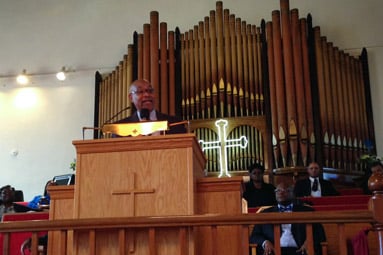Emmett Till’s cousin gives eyewitness account of relative’s death, says little has changed

Michelle Kim/The Daily Northwestern
Simeon Wright, Emmett Till’s cousin, tells his eyewitness account Sunday of Till’s story to community members at an Evanston church. Wright said the story of his death is still being told inaccurately after almost 60 years.
April 27, 2015
Almost 60 years have passed since the murder of Emmett Till, but people still do not tell his story accurately, Till’s cousin Simeon Wright said Sunday in Evanston.
Through a retelling of his eyewitness account, Wright took an audience at Mount Zion Missionary Baptist Church, 1113 Clark St., back to the summer of 1955, when the 14-year-old Till went to visit his family in Mississippi. Wright was 12 at the time and said he was fascinated by the stories Till brought with him from Chicago.
Wright recalled the day he was at Bryant’s Grocery & Meat Market when the store owner’s wife alleged Till grabbed her, put his arms around her and asked her on a date. None of these things happened, Wright said.
“We didn’t dare him to go to the store — the white folk said that,” Wright said. “They said that he had pictures of his white girlfriend. There were no pictures. They never talked to me. They never interviewed me.”
Wright said Till whistled at the store owner’s wife and then ran into a car without speaking with the woman or her husband.
A few days passed, and Till and his cousins had forgotten about their interaction with the store owner’s wife, Wright said. Early one morning, Wright was sleeping in the same bed as his cousin when he saw two white men — one holding a .45 caliber gun — take Till away, he said.
“They drove away with Emmett,” Wright said. “I never saw him alive again. After they left, I was in shock. I laid there until the sun came up the next morning. I got up the next day and my whole world had changed.”
Three days later, Till’s mutilated body was found in the Tallahatchie River. The neighbors kept silent out of fear for their own lives, Wright said.
The trial took place on Sept. 19, 1955. Wright’s father, Mose Wright, pointed out the murderer on the stand despite urges from neighbors not to testify, he said. Although he did not testify on the stand, Simeon Wright was subpoenaed to identify the body because he had previously confirmed a ring found on the body was Till’s.
But in the end, the verdict was “not guilty.”
Rev. Taurus Scurlock said he hoped hearing Till’s story would be a way for members of the community to move forward from recent acts of police violence.
“I need someone in here to think about Emmett Till,” Scurlock said. “I need someone here to think about Michael Brown. I need someone to think about all the young black people that are being killed senselessly.”
Evanston resident MacArthur Bickhem told The Daily he was 3 when he attended Emmett Till’s funeral in Chicago. When he approached the casket, Bickhem said his father lifted him up to see Till’s disfigured body.
“That was a very traumatic experience for me,” Bickhem said. “His head was warped and he didn’t look human. That left an impact on me, and I didn’t know it impacted the world at the time, but it was the first time in Chicago that I came to know what being a young black person is and what effects it could have. I haven’t seen much change.”
Encouraged by his wife, Wright wrote a book in 2010, “Simeon’s Story: An Eyewitness Account of the Kidnapping of Emmett Till,” because he was angered by inaccuracies he heard in the retelling of the story. Wright said for 20 years after the case, he didn’t talk about Till’s death, but decided to start telling his account so the truth could come out.
“He was murdered because he whistled at her,” Wright told The Daily. “I want people to see that under the Jim Crow system we had no protection. We still don’t have protection. I don’t get angry anymore because the lies have given me a door. I got a chance to tell what happened.”
Correction: A previous version of this article misstated Simeon Wright’s involvement in Emmett Till’s trial. Wright did not testify at the trial. The Daily regrets the error.
Email: yeareekim2018@u.northwestern.edu
Twitter: @yeareeka


